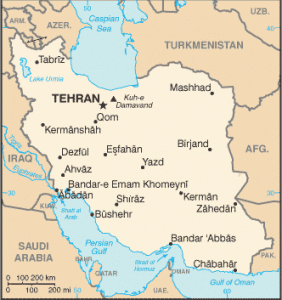Iran is very unlikely to intentionally provoke a conflict with the West and almost certainly would not initiate a first strike on the U.S. or its allies, including Israel, according to the top U.S. military intelligence official.
 Lieutenant General Ronald Burgess, director of the Defense Intelligence Agency, said Thursday that while Iran probably has the ability to “temporarily close the Strait of Hormuz with its naval forces,” as some Iranian officials have threatened to do if attacked or in response to sanctions on its oil exports by the U.S. and European Union, it is not likely they would make such a move.
Lieutenant General Ronald Burgess, director of the Defense Intelligence Agency, said Thursday that while Iran probably has the ability to “temporarily close the Strait of Hormuz with its naval forces,” as some Iranian officials have threatened to do if attacked or in response to sanctions on its oil exports by the U.S. and European Union, it is not likely they would make such a move.
“Iran has also threatened to launch missiles against the United States and our allies in the region in response to an attack,” Burgess said in testimony at a hearing today of the Senate Armed Services Committee, as if retaliatory military strikes aren’t a given. “However,” he said, “it is unlikely to initiate or intentionally provoke a conflict or launch a preemptive attack.”
It’s true, Iran would never preemptively attack the U.S. or Israel and thereby welcome a destructive and possibly fatal war on their own country from militaries far more superior than theirs. But the truth is, it appears Iran won’t even strike the U.S. or Israel even in retaliation.
While receiving exorbitant economic and military support from the U.S., Israel has financed, trained, and armed Iranian dissident groups to carry out terrorist attacks against Iranian nuclear scientists on Iranian soil. While the U.S. or Israel would consider that a declaration of war, Iran has merely complained about it, still declining to retaliate.
Additionally, Congress has heaped crippling economic sanctions on Iran’s oil and banking sectors, the Obama administration pressured European and Asian allies to embargo Iranian oil imports. Columbia University Professor Gary Sick has called this effort “the equivalent of a blockade. It’s an act of war.” And again, while the U.S. or Israel would consider this an act of war, the only Iranian response has been with rhetoric and not action.
The pretext for this U.S.-Israeli aggression has been the Iranian nuclear program, despite a near-consensus that it has no military dimension to it. Iran is very weak militarily and is on the defensive, while the U.S. and Israel are on the offensive. The fact that U.S. officials have to come out and articulate that Iran won’t attack us is a testament to the effectiveness of the war propaganda against Iran in the U.S. media.


